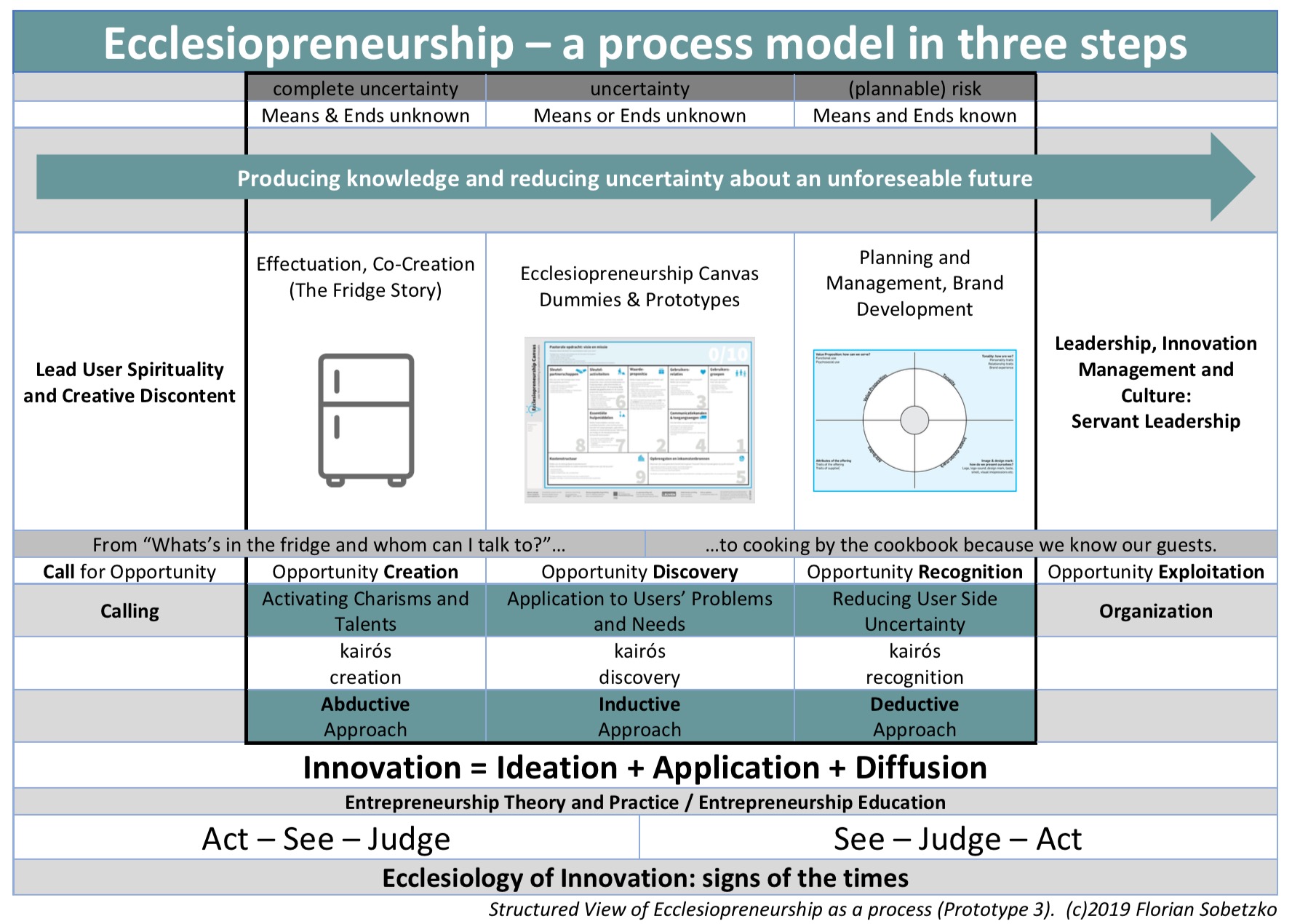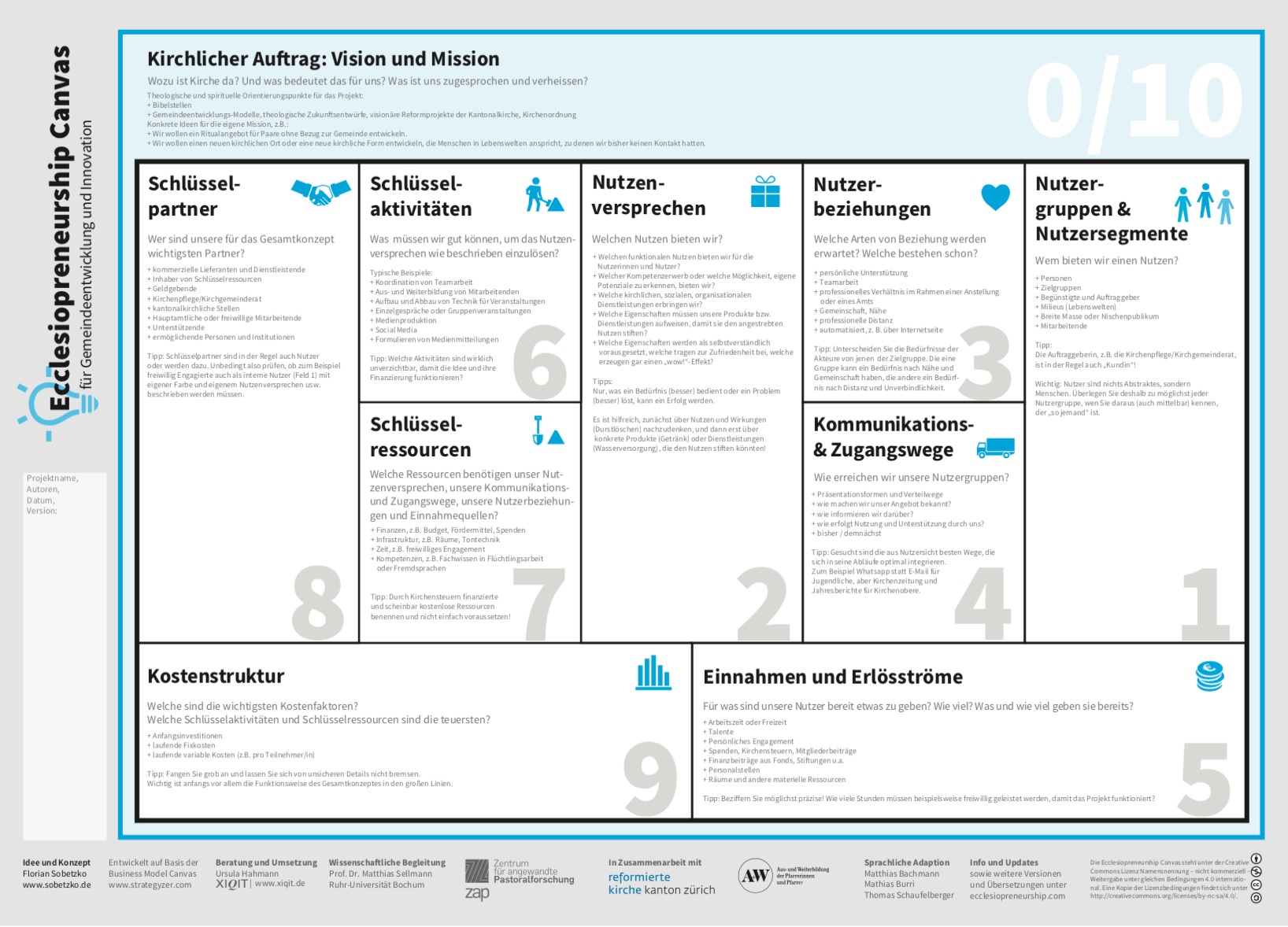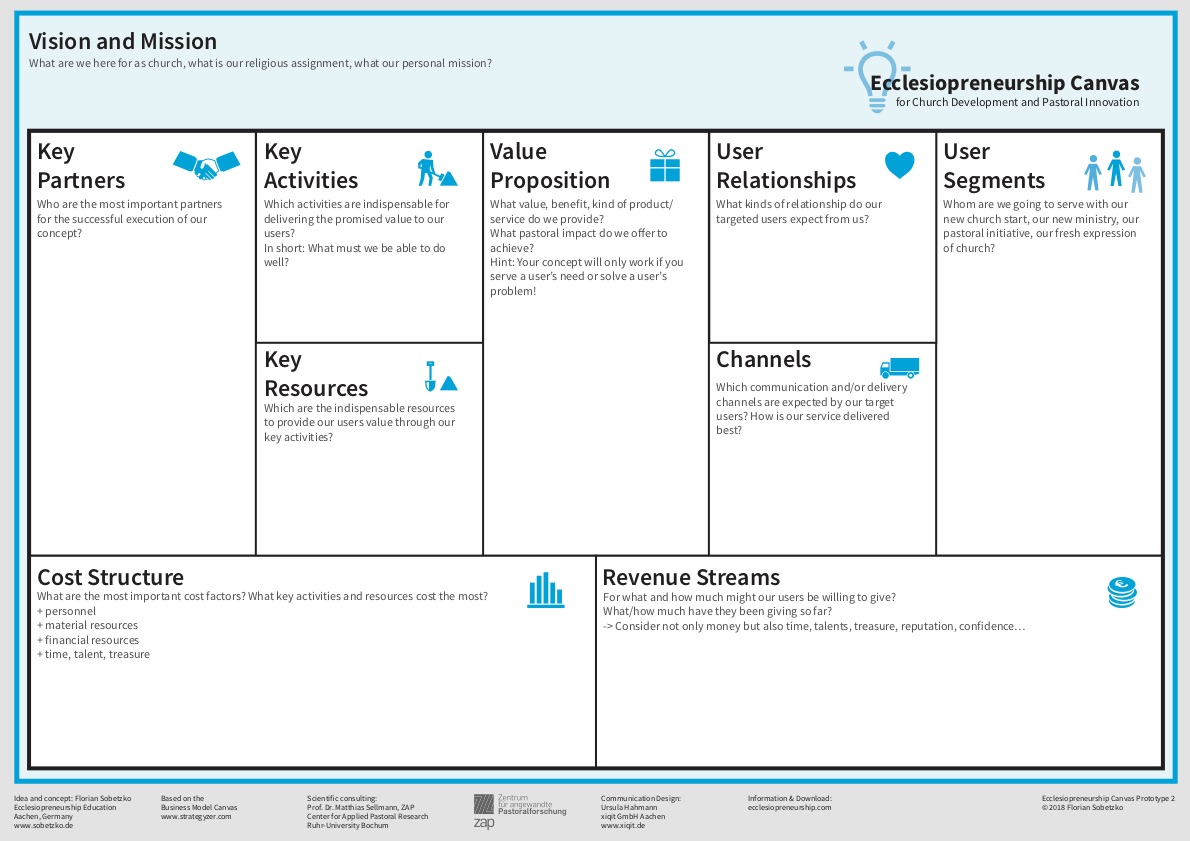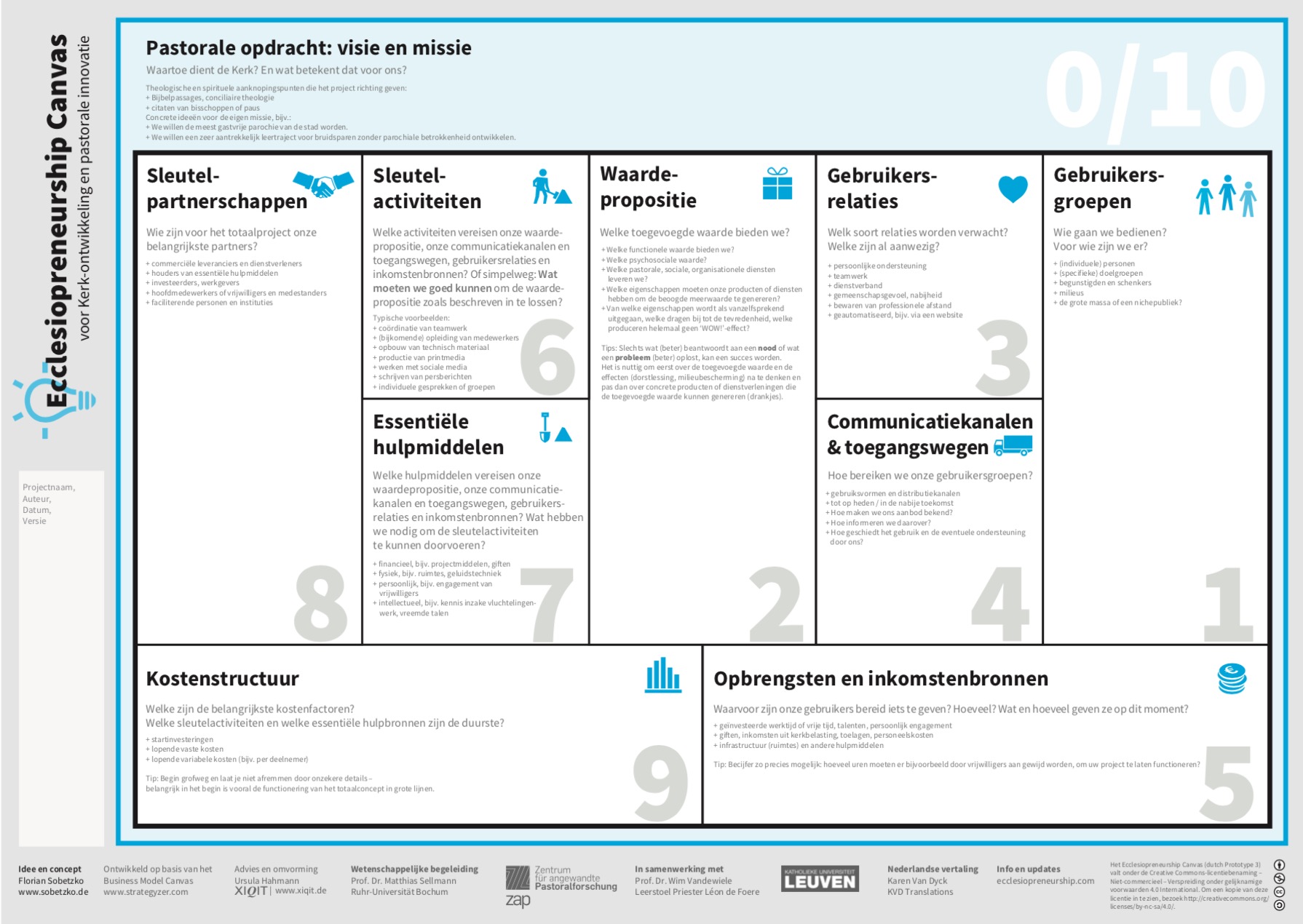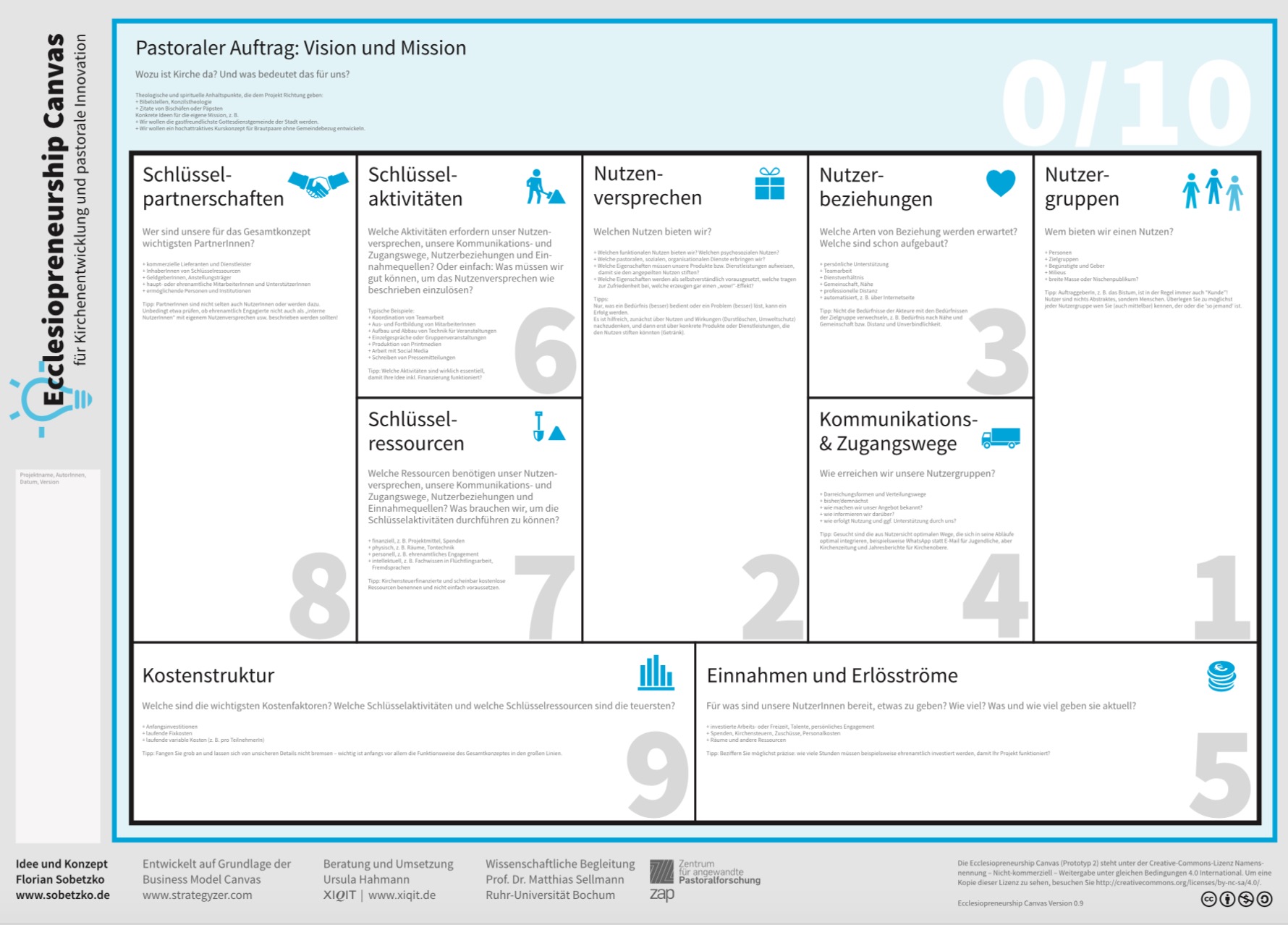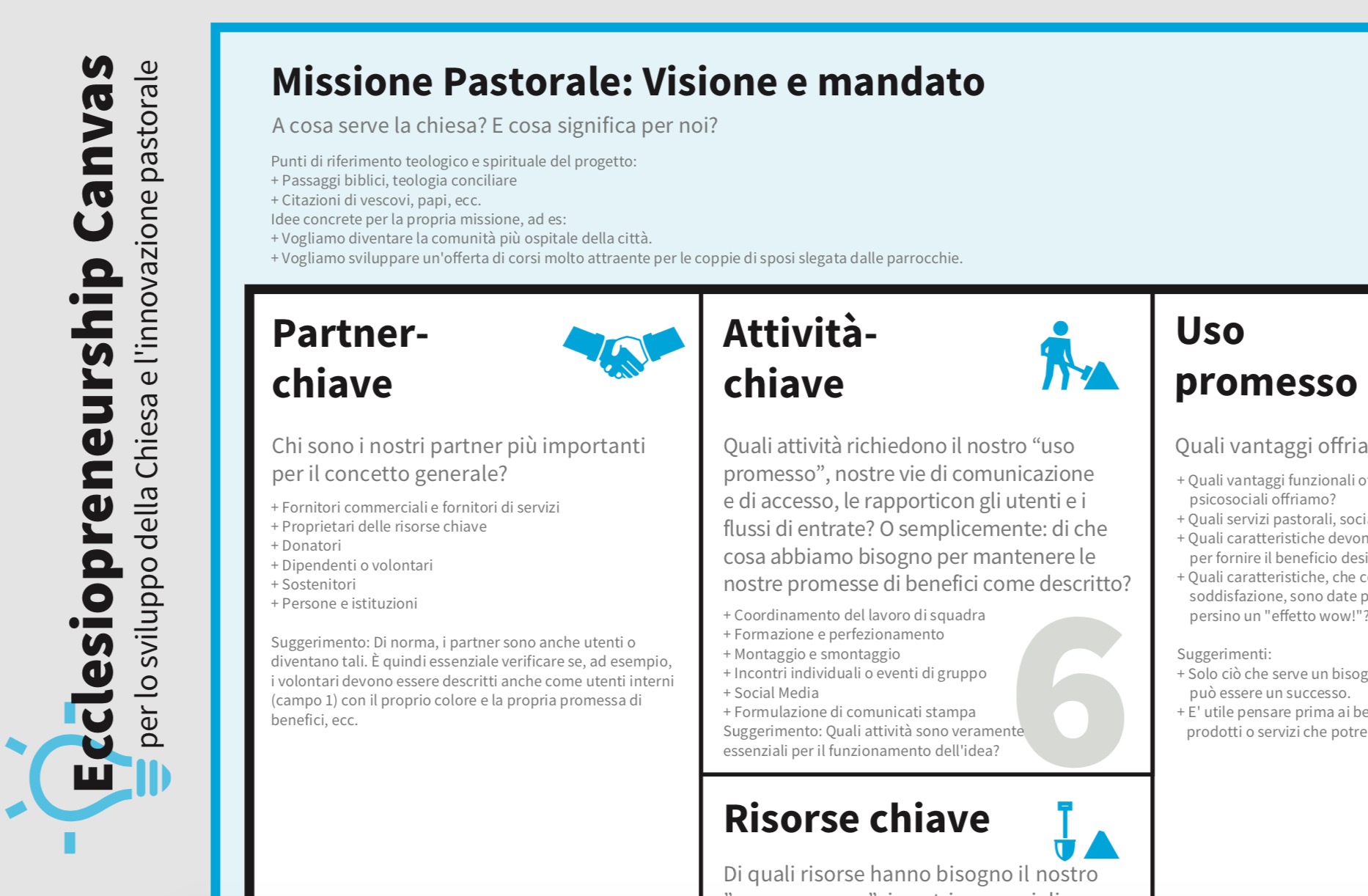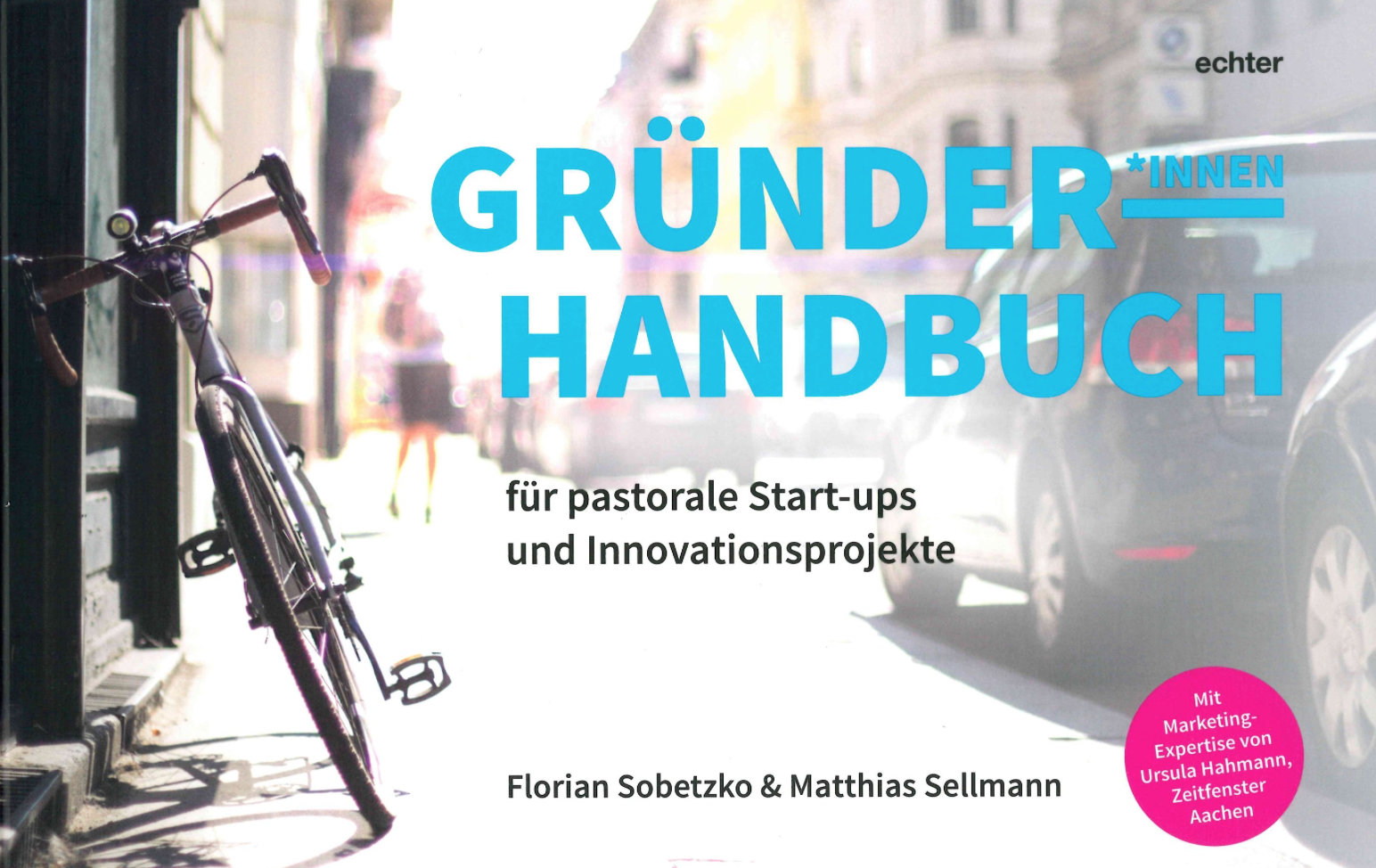What is Ecclesiopreneurship?
Towards an Interdisciplinary Approach to Church Development, Entrepreneurship and Innovation Expertise
This site is dedicated to the growing international community of church developers, pastoral pioneers, founders of so called fresh expressions of church, leadership, strategists, consultants and other pastoral innovation experts as well as to the academic researchers dealing with the field of Ecclesiopreneurship and Ecclesiopreneurship Education. It is intended as starting point for a better understanding of what Ecclesiopreneurship in fact is and what not.
A working definition:
Ecclesiopreneurship is about recognizing, discovering, creating kairós.
The field of Ecclesiopreneurship describes both the practice and the scientific investigation and reflection on how and by whom, under what circumstances and with what effect pastoral opportunities for future actualizations of church are recognized, discovered, created, evaluated and used.
The term Ecclesiopreneurship is a compound of greek ecclesía and english entrepreneurship, expressing an entrepreneurial perspective on pastoral matters of church development, in particular by pragmatistically applying entrepreneurial opportunity theory and practice to ecclesiologic concepts of kairòs and signs of the times.
Ecclesiopreneurship – a set of methods for church development
Ecclesiopreneurship offers a set of methods for new church starts, pastoral start-ups and innovation projects. Some call their ventures “Fresh Expressions of Church”. Tested and proven by hundreds of pastors, pastoral associates, deacons and other professional ecclesial ministers as well as volunteers the Ecclesiopreneurship toolset unites renowned management instruments as a reliable concept for church development:
Starting Up
Ecclesiopreneurship offers postmodern Spirituality and Theology of Innovation, based in bible studies and Vatican II Theology as well as in pragmatistic epistemology.
Cutting Edge Entrepreneurship
Effectuation is a well proven decision logic and set of methods for projects under complete uncertainty regarding means and ends. Effectuation allows non-entrepreneurs to act and decide entrepreneurial.
The Language of Founders worldwide
The Ecclesiopreneurship Canvas method with dummies and prototypes for the development and testing of new ecclesial ventures is derived from successful concepts like The Lean Launchpad and Lean Startup.
Reducing user-sided Uncertainties
The Brand Steering Wheel (Esch) as well as long established project managing and marketing strategies allow the successful refining and positioning of pastoral services.
Making innovation sustainable
Servant Leadership and newest concepts from technology innovation management and organizational innovation culture stand for sustainable and innovation friendly environments.
1
2
3
4
5
Ecclesiopreneurship is about systematically reducing flop-risks through co-creative innovation processes
with high user involvement.
Ecclesiopreneurship offers an open interface to entrepreneurs and other innovation experts in our neighborhood.
Ecclesiopreneurship – combining proven concepts from leadership, innovation management and entrepreneurship research and practice
The concepts and theory behind Ecclesiopreneurship are not the result of some wild brainstormings at the creative department. Ecclesiopreneurship combines highly renowned and serious theories and methods from innovation, entrepreneurship and leadership research, organizational development, marketing and of course theology.
This has an enormous implication for church development: Instead of teaching your working partners and volunteers to think more theologically and pastorally you offer a conceptual environment that makes it easy to engage for exactly the people you need: Successful and motivated experts in entrepreneurship, start-up development, entrepreneurship, leadership and innovation management.
It is extremely motivating for volunteers to bring in their talents and their expertise. And it might also quite have an impact when people can say that they learned how to create a startup – at church.
Choosing the right strategy for your situation
Ecclesiopreneurship as a methodology starts with an evaluation of uncertainties as shown in the center of this diagram:
- You don’t know yet what to offer and for whom, you know neither means nor ends. Perhaps there is nothing more than a will to start something new. This means big uncertainties. Since you cannot plan an unforeseeable future you work means-oriented. Let’s call this the ideation part of innovation. A typical strategy here would be effectuation.
- You know either the means or the ends, either the product/service or the audience who’s needs or problems you want to access. We’ll call this the application part of innovation: It’s about testing new hypotheses regarding possible solutions. A perfect strategy here will be the canvas method with dummies and prototypes for testing.
- You have a clear and tested hypothesis about what to offer and for whom, thus know the means and the ends of your project. You question is, how to bring the product to the audience and how to reduce their uncertainties about what to expect from you. Let’s call this the diffusion part of innovation. A typical tool would be the brand steering wheel or project management.
Learning from the world outside.
The expertise neccessary for church development and pastoral innovation is already available out there. By learning the simplicity and effectiveness of tools from innovation and entrepreneurship you open your challenges and problems for the creativity of a neighborhood full of potential solvers.
That’s why Ecclesiopreneurship combines leading frameworks and methods from renowned research areas and authors in innovation theory, systematic and pastoral theology, entrepreneurship and leadership research.
Effectuation
Since Saras S. Sarasvathy introduced Effectuation with her seminal and award winning publication in 2001, it has become a centerpiece of entrepreneurship research and education worldwide. In a single metaphor Effectuation is perfectly described with the famous fridge metaphor: Do you cook by the book or with what’s in your fridge? Effectuation is a specific decision logic derived from behavioral studies with successful entrepreneurs under complete uncertainty regarding means and ends.
Business Model Innovation
The Ecclesiopreneurship Canvas method is directly derived from the Business Model Canvas described in the bestseller Business Model Generation by Yves Pigneur and Alexander Osterwalder, based on Osterwalder’s research about business models. Business Model Innovation – strongly connected with names like Henry Chesbrough, Oliver Gassmann or Frank Thomas Piller – is a dominant trend in management and consulting.
Open Innovation
Open Innovation, scientifically linked to the innovation researcher Henry Chesbrough, has become a container term for concepts that involve customers, users and even uninvolved and unknown external partners as potential problem solvers. Open Innovation at it’s best can be found in strategies like idea contests, where organizations learn to granulate complexity into smaller problem packages for a so called broadcast search. One of the best introductions in German is the book “Interaktive Wertschöpfung” by Ralf Reichwald and Frank T. Piller.
Marketing and Brand Development
Even when church developers have developed precise ideas about what to do and for or with whom, they will have to deal with a much bigger uncertainty on the user side. Bringing pastoral innovations to life is very similar to service innovations. As shown profoundly by Ursula Hahmann, because services are not tangible (you cannot touch and test them like e.g. a new phone) they require a high amount of confidence. Service marketing teaches us how to communicate our ideas to our users in a way that helps them evaluate what to expect. This is extremely relevant for a better understanding of faith focussed innovations.
Lean Startup, Design Thinking, Lean Launchpad
Connected for example to entrepreneurship experts like Eric Ries or Steven Blank there are a variety of well proven concepts for product and service development, startup ventures and even organizational development, that have one thing in common: They maximize the contact with the customer beginning on day one. Creating innovation in the 21st century means working with dummies and prototypes, means asking customers about their opinion before going to serial production. This way you can reduce flop risks, but most of all: Theologically speaking this co-creative approach exposes the fact that church must fundamentally be thought as a co-creation (GS 44).
User Innovation
The phenomenon and the concepts of User Innovation and especially the so called Lead User Innovation are connected most of all to the research and practice of Eric von Hippel.
Von Hippel is an american economist and innovation expert who teaches at the MIT Sloan School of Management, focussing on distributed and open innovation. Ecclesiopreneurship connects User Innovation to the theology of common priesthood and anonymous christianity (Rahner) as well as it interprets Churchplanters and founders of Fresh Expressions of church as Lead Users who improve their ecclesial professions instead of waiting for someone else to do it.
Entrepreneurial Opportunity Theory
For decades entrepreneurship research had been focused on trait theories, reflecting on skills and characteristics of good entrepreneurs, thus focussing on the person of the entrepreneur. In the 1990s there happened an important change of perspective, putting the entrepreneurial opportunity in the center of attention. This change in entrepreneurship research was coined by a seminal article by Senkaran Venkataraman about “The distinctive Domain of Entrepreneurship Research” (1997). The opportunity approach got famous with Venkat’s award winning publication together with Scott Shane under the title “The promise of entrepreneurship as a field of research” (2000). Pastoral Theology gains an enormous inspiration from a combination of opportunity theory with the theology of kairós and the so called signs of the times.
Innovation Management
Studying innovation in practice and research there is a clear indication that innovation is a bottom-up phenomenon requiring organizations to involve the users (customers) in the design process. At the same time it is clear that there is a need for innovation management to simply raise the chances that new things can happen. Innovation management reduces cannibalization effects (“old cannibalizes new”) and thus is something different than change management.
Servant Leadership
Servant Leadership, coined by Robert K. Greenleaf in 1970 as a leadership philosophy combining exemplary servantship and leadership has become one of the leading ethical and resource oriented leadership concepts. Around the year 2000 leadership researchers like Robert C. Liden (US), Dirk van Dierendonck (NL) or Armin Bircher Verdorfer (DE) have provided a profound and multilingual measurement instrument for Servant Leadership behavior. This younger research of the last two decades makes Servant Leadership both a spiritually attractive leadership philosophy and a reliable leadership concept for successful organizational development.
“We need more of the crazy ones to develop new expressions of church” (Rev. Volker Roschke, Berlin)
“I agree, Mr. Roschke – but we also need professionals who can work together with the crazy ones” (Prof. Medart Kehl SJ, Frankfurt)
Please help us with your opinion.
Ecclesiopreneurship: A growing community of users, enablers and experts.
Ecclesiopreneurship has been a leading and growing trend for pastoral innovation.Hundreds of pastoral practitioners, strategists and consultants have successfully started working especially with Effectuation and the Ecclesiopreneurship Canvas method. This method has become one of the de facto standards for a systematic design of pastoral innovations and pioneer ministry. The following map marks some of the dioceses, educational and research institutes as well as different denominations in Germany, Austria, Switzerland, Belgium and even the United States that have introduced Ecclesiopreneurship in their fields.
Institute for Pastoral Studies, Loyola University
Universität Zürich
Bistum Aachen
Gründertraining für Seelsorger*innen 2012, 2014, 2017, 2019
Bistum Innsbruck
Bistum Würzburg
KU Leuven
Erzbistum Köln
Ruhr-Universität Bochum
Bistum Linz
Bistum Limburg
Bistum Münster
Bistum Trier
Bistum Mainz
YOT Brugge
Evangelische Kirche im Rheinland
Erzbistum München-Freising
Erzbistum Paderborn
Bistum Essen
Bistum Speyer
Bistum Speyer und BDKJ Speyer
Bistum Fulda
Evangelische Landeskirche Württemberg
Erzbistum Hamburg
Bistum Rottenburg-Stuttgart
Evangelisch-Methodistische Kirche in der Schweiz
Bistum Fulda
Evangelische Kirche im Kirchenkreis Aachen
Bistum Salzburg
Unsubscribing is easy.
Why not leave your address and get updates?
Literature
For the convenience especially of the researchers and students here are some starting points.
- Acs, Z. J. and D. B. Audretsch, Eds. (2010). Handbook of Entrepreneurship Research. An Interdisciplinary Survey and Introduction. International Handbook Series on Entrepreneurship. New York, Springer-Verlag.
- Alvarez, S. A., et al. (2010). Debates in entrepreneurship: Opportunity formation and implications for the field of entrepreneurship. Handbook of entrepreneurship research, Springer: 23-45.
- Archer, G. R., et al. (2009). “Towards an alternative theory of entrepreneurial success: Integrating bricolage, effectuation and improvisation (summary).” Frontiers of entrepreneurship research 29(6): 4.
- Blank, S. (2013). “Why the lean start-up changes everything.” Harvard business review 91(5): 63-72.
- Blank, S. (2013). The four steps to the epiphany, K&S Ranch.
- Brettel, M., et al. (2012). “Corporate effectuation: Entrepreneurial action and its impact on R&D project performance.” Journal of Business Venturing 27(2): 167-184.
- Faschingbauer, M. (2013). Effectuation: Wie erfolgreiche Unternehmer denken, entscheiden und handeln, Schäffer-Poeschel Verlag für Wirtschaft Steuern Recht.
- Faschingbauer, M., et al. (2013). Effectuation: Gestalten statt Vorhersagen. Das unternehmerische Unternehmen. D. Grichnik and O. Gassmann, Springer Fachmedien Wiesbaden: 3-21.
- Fueglistaller, U., et al. (2012). Entrepreneurship. Wiesbaden, Gabler.
- Grichnik, D., et al. (2016). Entrepreneurship: Gestalten der unsicheren Zukunft mit der unternehmerischen Methode. Business Innovation: Das St. Galler Modell. C. P. Hoffmann, S. Lennerts, C. Schmitz, W. Stölzle and F. Uebernickel. Wiesbaden, Springer Fachmedien Wiesbaden: 39-54.
- Grichnik, D. and O. Gassmann (2013). Das unternehmerische Unternehmen: Revitalisieren und Gestalten der Zukunft mit Effectuation-Navigieren und Kurshalten in stürmischen Zeiten, Springer Gabler.
- Hébert, R. F. and A. N. Link (2009). A history of entrepreneurship, Routledge.
- Mauer, R. and D. Grichnik (2011). “Dein Markt, das unbekannte Wesen: Zum Umgang mit Marktunsicherheit als Kern des Entrepreneurial Marketing.” Zeitschrift für Betriebswirtschaft 81(6): 59-82.
- Meinel, C. and J. von Thienen (2016). “Design Thinking.” Informatik-Spektrum 39(4): 310-314.
- Osterwalder, A. (2004). “The business model ontology: A proposition in a design science approach.”
- Osterwalder, A. and Y. Pigneur (2002). Business models and their elements. Position Paper presented to the International BITA B4U workshop, Business Models for Innovative Mobile Services. Delft, The Netherlands.
- Osterwalder, A. and Y. Pigneur (2013). Business model generation. A handbook for visionaries, game changers, and challengers. Hoboken, NJ, Wiley.
- Sarasvathy, S. (2015). “The Downside of Entrepreneurial Opportunities.”
- Sarasvathy, S. D. (2001). “Causation and effectuation: Toward a theoretical shift from economic inevitability to entrepreneurial contingency.” Academy of Management Review 26(2): 243-263.
- Sarasvathy, S. D. (2001). “What makes entrepreneurs entrepreneurial?”.
- Sarasvathy, S. D. (2009). Effectuation: Elements of entrepreneurial expertise, Edward Elgar Publishing.
- Sarasvathy, S. D., et al. (2003). Three Views of Entrepreneurial Opportunity. Handbook of Entrepreneurship Research, Springer: 141-160.
- Sarasvathy, S. D. and S. Venkataraman (2011). “Entrepreneurship as method: open questions for an entrepreneurial future.” Entrepreneurship Theory and Practice 35(1): 113-135.
- Shane, S. and S. Venkataraman (2000). “The promise of entrepreneurship as a field of research.” Academy of Management Review 25(1): 217-226.
- Venkataraman, S. (1997). “The distinctive domain of entrepreneurship research.” Advances in entrepreneurship, firm emergence and growth 3(1): 119-138.
- Zott, C., et al. (2010). “The business model: Theoretical roots, recent developments, and future research.” IESE Business School-University of Navarra: 1-43.
- Churchill, J., et al. (2009). “Lead User Project Handbook – A practical guide for lead user project teams.”
- Fritsch, A. (2012). Open Innovation – der Kompetenz des Kunden trauen. Siehe, ich mache alles neu: Innovation als strategische Herausforderung in Kirche und Gesellschaft. V. Dessoy and G. Lames. Trier, Paulinus: 219.
- Gassmann, O., et al. (2017). Geschäftsmodelle entwickeln: 55 innovative Konzepte mit dem St. Galler business model navigator, Carl Hanser Verlag GmbH Co KG.
- Grichnik, D., et al. (2016). Entrepreneurship: Gestalten der unsicheren Zukunft mit der unternehmerischen Methode. Business Innovation: Das St. Galler Modell. C. P. Hoffmann, S. Lennerts, C. Schmitz, W. Stölzle and F. Uebernickel. Wiesbaden, Springer Fachmedien Wiesbaden: 39-54.
- Von Hippel, E. (1986). “Lead users: a source of novel product concepts.” Management science 32(7): 791-805.
- Von Hippel, E. (1994). ““Sticky information” and the locus of problem solving: implications for innovation.” Management science 40(4): 429-439.
- von Hippel, E. (2005). Democratizing Innovation, MIT press.
- Von Hippel, E. (2007). The sources of innovation, Springer.
- Lercher, H. J. (2017). “Big Picture Das Grazer Innovationsmodell (Big Picture the Innovation Model).”
- Meinel, C. and J. von Thienen (2016). “Design Thinking.” Informatik-Spektrum 39(4): 310-314.
- Osterwalder, A. (2004). “The business model ontology: A proposition in a design science approach.”
- Osterwalder, A. and Y. Pigneur (2002). Business models and their elements. Position Paper presented to the International BITA B4U workshop, Business Models for Innovative Mobile Services. Delft, The Netherlands.
- Osterwalder, A. and Y. Pigneur (2013). Business model generation
- a handbook for visionaries, game changers, and challengers. Hoboken, NJ, Wiley.
- Piller, F. (2015). Zu viele Ideen sind der Feind von Innovation. S. Guggenberger. Produktion. Technik und Wirtschaft für die deutsche Industrie.
- Piller, F. (2017). “Not invented here. Frank Piller im Interview über Open Innovation.” brandeins 01.
- Piller, F. T. and H.-G. Servatius, Eds. (2014). Der Innovationsmanager: Wertsteigerung durch ein ganzheitliches Innovationsmanagement. Düsseldorf, Symposion.
- Redlich, T. (2011). Wertschöpfung in der Bottom-up-Ökonomie, Springer DE.
- Reichwald, R. and F. T. Piller (2009). Interaktive Wertschöpfung. Open Innovation, Individualisierung und neue Formen der Arbeitsteilung. Wiesbaden, Gabler.
- Thomke, S. and E. Von Hippel (2002). “Customers as Innovators. A new way to create value.” Harvard business review 80(4): 74-81.
- Zott, C., et al. (2010). “The business model: Theoretical roots, recent developments, and future research.” IESE Business School-University of Navarra: 1-43.
- Bauer, C. (2010). Ortswechsel der Theologie : M.-Dominique Chenu im Kontext seiner Programmschrift “Une école de théologie: Le Saulchoir” Bd. 2 […]. Berlin [u.a.], LIT-Verl.
- Bauer, C. (2011). “Indiana Jones in der Spätmoderne? Umrisse einer Pastoraltheologie der kreativen Differenzen.” Lebendige Seelsorge 62(1): 30-35.
- Hennecke, C. (2006). Kirche, die über den Jordan geht: Expeditionen ins Land der Verheißung. Münster, Aschendorff.
- Hennecke, C. (2010). Glänzende Aussichten – wie Kirche über sich hinauswächst. Münster, Aschendorff.
- Hennecke, C. (2013) Was meint Lokale Kirchenentwicklung – ein theologischer Werkstattbericht. futur2. Zeitschrift für Strategie und Entwicklung in Gesellschaft und Kirche 01/2013.
- Reppenhagen, M. “Fresh Expressions – Kirchenentwicklung in England.”
- Sellmann, M. (2015). Katholische Kirche heute: Siebenfache Pluralität als Herausforderung der Pastoralplanung. Katholizismus in Deutschland. Zeitgeschichte und Gegenwart. W. Damberg and K.-J. Hummel. Paderborn: 113-140.
- Sellmann, M. (2016). “Pastoraltheologie als “Angewandte Pastoralforschung”.” Pastoraltheologische Informationen 35(2): 105-116.
- Sellmann, M., et al. (2013). Gemeinde ohne Zukunft?: Theologische Debatte und praktische Modelle, Verlag Herder.
- Sobetzko, F. (2012). “Ekklesiopreneure und Elektrotechniker. Jugendpastoral 2.0 in der Jugendkirche kafarna:um Aachen.” Lebendige Seelsorge 63(1/2012).
- Sobetzko, F. (2013). Ein hochmagnetischer Bereich pastoralen Handelns! : Gründertraining für katholische Hauptamtliche ; ein Gespräch.
- Sobetzko, F. (2014). “Bodybuilding für den Leib Christi. Lead Customer und Innovationsprozesse in der Kirche.” euangel. Magazin für missionarische Pastoral 2/2014.
- Sobetzko, F. (2014). “Interaktive Wertschätzung. Kirche innovationsgerichtet führen.” Lebendige Seelsorge(3/2014): 160-166.
- Sobetzko, F. (2015). Servant Leadership: Theologische und führungstheoretische Anhaltspunkte zu einem transatlantischen Fundstück. Zeiten der pastoralen Wende? Studien zur Rezeption des Zweiten Vatikanums – Deutschland und die USA im Vergleich. A. Henkelmann and G. Sonntag. Münster, Aschendorff Verlag: 313-340.
- Sobetzko, F. (2017). „Wie gründet man ein Gründertraining?“ – Das Aachener Gründertraining für SeelsorgerInnen als Prototyp kirchlicher Innovationsdidaktik. Gründerhandbuch für pastorale Startups und Innovationsprojekte. F. Sobetzko and M. Sellmann. Würzburg, Echter Verlag.
- Sobetzko, F., et al. (2016). “Die Ecclesiopreneurship Canvas. Die Gründerleinwand für pastorale Innovationen.” futur2. Zeitschrift für Strategie und Entwicklung in Gesellschaft und Kirche 01/2016.
- Sobetzko, F. and M. Sellmann (2017). Gründerhandbuch für pastorale Start-ups und Innovationsprojekte. Würzburg, Echter.
- Speckenheuer, K. and M. Sellmann (2018). Kurshandbuch zur Frischzelle. Frische Ideen für Kirchen- und Gemeindeentwicklung. Freiburg im Breisgau, Verlag Herder.
- Spielberg, B. (2015). No money – no mission? No mission – no money! Von der – nicht nur finanziellen – Beziehung der Kirche zu ihren eigenen Mitgliedern. Zeiten der pastoralen Wende. A. Henkelmann and G. Sonntag. Münster: 177-209.
- Dessoy, V. (2016) Nur Mut. Vom Pfad abweichen und den Systemwechsel vorbereiten. futur2. Zeitschrift für Strategie und Entwicklung in Gesellschaft und Kirche 01,
- Van Dierendonck, D. (2011). “Servant leadership: A review and synthesis.” Journal of Management 37(4): 1228-1261.
- Van Dierendonck, D. and I. Nuijten (2011). “The Servant Leadership Survey: Development and Validation of a Multidimensional Measure.” J Bus Psychol 26(3): 249-267.
- Ebener, D. R. (2010). Servant leadership models for your parish. New York, Paulist Press.
- Ebener, D. R. and D. J. O’Connell (2010). “How might servant leadership work?” Nonprofit Management and Leadership 20(3): 315-335.
- Ebener, D. R. and U. St. Ambrose (2007). The Servant Parish: A Case Study of Servant Leadership and Organizational Citizenship Behaviors in High-performing Catholic Parishes, St. Ambrose University.
- Faschingbauer, M. (2013). Effectuation: Wie erfolgreiche Unternehmer denken, entscheiden und handeln, Schäffer-Poeschel Verlag für Wirtschaft Steuern Recht.
- Faschingbauer, M., et al. (2013). Effectuation: Gestalten statt Vorhersagen. Das unternehmerische Unternehmen. D. Grichnik and O. Gassmann, Springer Fachmedien Wiesbaden: 3-21.
- Greenleaf, R. K. (1977). Servant leadership: A journey into the nature of legitimate power and greatness. New York, Paulist Press.
- Grichnik, D. and O. Gassmann (2013). Das unternehmerische Unternehmen: Revitalisieren und Gestalten der Zukunft mit Effectuation-Navigieren und Kurshalten in stürmischen Zeiten, Springer Gabler.
- Hahmann, U. (2016) Bitte weitersagen: Fürchtet euch nicht. . futur2. Zeitschrift für Strategie und Entwicklung in Gesellschaft und Kirche 01/2016,
- Hauschildt, J., et al. (2016). Innovationsmanagement. München, Vahlen.
- Jürgens, B. (2016). Raus aus der Beziehungskiste : mehr Platz durch indirekte Führung.
- Jürgens, B. (2017). Mehr als bunte Bilder und flotte Sprache : wie kann der Arbeitgeber Kirche auch in Zukunft Mitarbeiter gewinnnen?
- Pircher Verdorfer, A. and C. Peus (2014). “The Measurement of Servant Leadership.” Zeitschrift für Arbeits- und Organisationspsychologie A&O 58(1): 1-16.
- Pircher Verdorfer, A., et al. (2014). Servant Leadership aus wissenschaftlicher Sicht: Erfahrungen mit dem Servant Leadership Survey (SLS). Servant Leadership: Prinzipien dienender Unternehmensführung. H. H. Hinterhuber, A. Pircher-Friedrich, R. Reinhardt and L. Schnorrenberg. Berlin.
- Zimmer, A. (2007). Vom Ehrenamt zum Bürgerschaftlichen Engagement. Local Governance—mehr Transparenz und Bürgernähe?, Springer: 95-108.
- Zinkl, G. (2011). Zwischen Heilssakrament und Management. Die Ämterstruktur der katholischen Kirche aus der Perspektive des Kirchenrechts und der Organisationslehre, Universität Regensburg.
- Coon, Christian (2017). Failing Boldly. How Falling Down in Ministry Can Be the Start of Rising Up.
- Nixon, P. (2006). I refuse to lead a dying church! Cleveland, Ohio, Pilgrim Press.
- Sobetzko, Florian (2017). Stille Wörtchen. Von Null auf Gott in 90 Sekunden. Herder Verlag, Freiburg im Breisgau.
- Joas, H. (1992). Die Kreativität des Handelns, Suhrkamp Frankfurt aM.
- Joas, H. and J. Beckert (2001). Action Theory. Handbook of Sociological Theory. J. Turner, Springer US: 269-285.
- Peirce, C. S. (1976). Schriften zum Pragmatismus und Pragmatizismus, herausgegeben von Karl-Otto Apel und übersetzt von Gert Wartenberg.
- Reichertz, J. (2013). Die Abduktion in der qualitativen Sozialforschung: über die Entdeckung des Neuen, Springer-Verlag.

The author of this page
Florian Sobetzko is a pastoral associate with almost 20 years of experience in ecclesial ministry, specialized on youth and young adult pioneer ministry. From 2012 to 2017 he served as personnel developer and innovation evangelist in his diocese, since 2013 he has been a associate researcher at Center for Applied Pastoral Research at Bochum University. Since about 2010 he has been freelancing as innovation expert, trainer and consultant with his small venture Ecclesiopreneurship Education, teaching hundreds of strategists and practitioners internationally.
More info: http://www.sobetzko.de
Impressum
Ecclesiopreneurship Education
Florian Sobetzko
Eupener Str. 130b
D-52066 Aachen
Germany
Europe
florian@sobetzko.de
Tel. +49-241-99711500
Follow our updates on our facebook page for the Ecclesiopreneurship Canvas.
Books and Posters
Order Gründerhandbuch and ready printed Ecclesiopreneurship Canvas Posters online at gruenderhandbuch-seelsorge.de.
